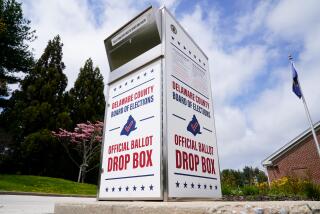Democrats Hope to Scare Up Some Votes : Politics: Campaign ads focus on what to fear about the Republicans. Tactic derides GOP’s ‘contract’ as it tries to get voters to the polls.
- Share via
WASHINGTON — Democrats who once assured Americans that they had nothing to fear but fear itself now are striving to scare them into going to the polls in hopes of staving off a potential disaster in next month’s midterm election.
The party’s latest effort to shake off the apathy that seems to prevail among their traditional supporters was unveiled here Wednesday--a $2-million multi-state television advertising campaign, echoing themes sounded earlier in the week by President Clinton and warning that votes for Republicans could mean a return to the economic hard times that ended the George Bush presidency.
The salvo seems aimed particularly at union members who still make up a key part of the Democratic coalition, though many drifted to the GOP during the Ronald Reagan presidency.
Meanwhile, Democrats and their interest group allies around the country are spreading other alarms: warning women that a GOP victory could mean restriction of abortion rights, warning senior citizens about threats to Social Security and Medicare, and warning all their allies about dangers from the “radical” Christian right.
Scaring voters is “about all the Democrats can do,” said University of Texas political scientist Walter Dean Burnham, a specialist in voter turnout. “They don’t have any other assets.”
The difficulty posed by low turnout in an off-year election is not new for Democrats, who tend to draw much of their strongest support from the lower end of the socioeconomic scale. Such voters are less likely to go to the polls, particularly in a non-presidential campaign, than more affluent, better educated citizens who are more inclined to favor Republicans.
But the problem has been heightened in this campaign, professionals in both parties said, by Clinton’s efforts to depict himself as “a different kind of Democrat.” Appealing more to middle-class centrist voters has not offered the liberal constituencies that make up the Democratic Party’s core much reason to go out and vote.
“(The North American Free Trade Agreement) and welfare reform don’t do much for the Democratic base,” said Democratic political consultant Joe Trippi. The trade pact was one of Clinton’s biggest legislative accomplishments, while welfare reform, along with another effort at health care reform, tops his domestic agenda for next year. While Clinton claims credit for helping to revive the economy and cut unemployment, analysts said that lower-middle-income workers and their families have yet to feel much benefit from the recovery.
Among blacks, considered the most reliable of Democratic voters, “there has been the perception that Clinton had lots of nice words but no action,” said Curtis Gans, head of the Committee for the Study of the American Electorate, a nonpartisan group that analyzes voting trends.
Gans suggested that Clinton’s decision to send troops to Haiti might boost his stock in the black community, but other analysts said they doubt that the plight of blacks in Haiti matters enough to blacks here to spur their turnout.
Considering the overall mood of voter alienation, reflected in the low turnout in this year’s state primaries, most analysts predict that turnout in November will be low for both parties, comparable to 1990 when it barely climbed above 36% of the voting-age population.
But experts in both parties said that Democrats are likely to suffer most.
“People who are dissatisfied with the President are very energized and intense,” said Bill McInturff, whose polling firm is used by about 60 GOP House and Senate candidates. “The people who do support the President are very squishy and reluctant to vote.”
“What appears to be happening is that the Democratic base is not coming out and the Republican base, basically people who are fed up with Washington . . . see this year as a vehicle to express their displeasure,” said Saul Shorr, a Democratic consultant for 22 candidates around the country.
In the face of these unfavorable national trends, most Democratic strategists have advised their candidates to focus their campaigns on local issues, emphasizing their own individual strengths while taking potshots at their GOP foes.
But after Republican candidates around the country committed themselves en masse to a “contract with America,” a 10-point Reaganesque plan for cutting taxes, trimming social programs and beefing up the military, Democrats and their partisans seized on the manifesto as a target for a sustained offensive.
The National Council of Senior Citizens, representing about 4 million retired union workers, branded the Republican contract an “economic suicide pact drawn up by those all too willing to turn away from old ‘covenant’ programs, such as Social Security and Medicare.”
Ellen Malcolm, president of EMILY’s List, a political action committee that supports Democratic women candidates who favor the right to abortion, contended that the contract showed Republican success in the fall “will create a leadership that either ignores or votes against the needs of women and families.”
The new Democratic advertising campaign also targets the Republican contract, relying on the imagery of television commercials. One of the four commercials that will start airing later this week chides Republicans for blocking Clinton legislative initiatives, such as the anti-crime bill and his economic program. But the other three ads zero in on the GOP’s own goals, as expressed in the contract.
Republicans are shown signing the contract while a narrator warns that what the GOP has in mind are “huge tax cuts for the wealthy . . . gigantic new job-killing deficits . . . deep cuts in Medicare, education and veterans’ benefits.”
Democratic National Chairman David Wilhelm said that the ads would run in about 10 states.
More to Read
Get the L.A. Times Politics newsletter
Deeply reported insights into legislation, politics and policy from Sacramento, Washington and beyond. In your inbox twice per week.
You may occasionally receive promotional content from the Los Angeles Times.










